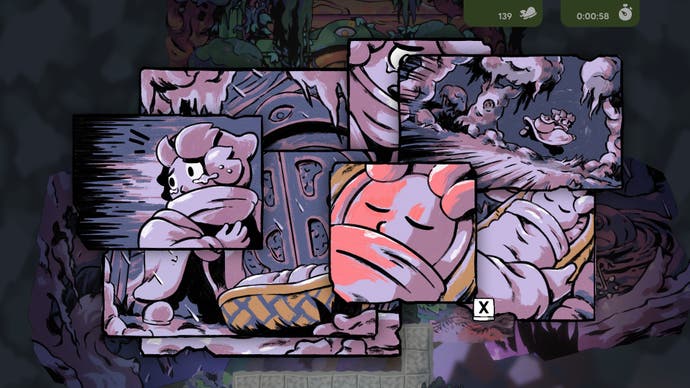Arranger: A Role-Puzzling Adventure review - ingenious challenges with the lightest of touches
ridrunnerG.
One of my favourite things in games is when the world wraps around. It's a simple kind of magic, and it's been there since the bright, fizzing days of the arcades, and yet I never even come close to getting tired of it. You race all the way to the right of the screen, and then - wow! - you're suddenly back at the very left. You run all the way to the top, and with one final push you find yourself back at the bottom.
Arranger: A Role-Puzzling Adventure is even more in love with this than I am. It's wraparound screens: the video game. Arranger tells the story of Jemma, a misfit trying to escape from a culture of cheerful stagnation. She leaves her home town and moves across the wider world trying to put right what has gone wrong and, in doing so, find a place for herself. All great. But she does this by manipulating a grid system of movement which means that if she moves off the top of every column she will appear back at the bottom, and if she moves off the right of every row - well, you get the idea.
There's more, of course. Each row or column Jemma is in moves as she does, which means that anything on the row or column moves along with her. This is a puzzle game, and this stuff forms the heart of the puzzles. Most objects just come along with Jemma, wrapping merrily around as she does. But some, lined in purple, are either locked in place, which means they don't move at all, or will move but won't wrap: they'll snag on the edges and freeze the whole line.
And so you spend a lot of time in Arranger just working out how to move forward: how to navigate a path filled with dustbins that won't wrap, or how to get past a boulder that won't move at all. The answer is almost always simple - if that boulder's in the middle of the path and you need to get to the left of it, maybe the counter-intuitive solution is to head all the way to the right of it and let the wraparound magic take you back to the left! - but it also almost always feels like a revelation.
Arranger's a game of little epiphanies, then, and it's also a game that allows you to reach these epiphanies in the best way, by just playing around with the sandbox. Each puzzle tends to be fairly compact: levels can be much larger than a single screen, but the puzzley bits almost always hinge on things that lie well within view. This means, when faced with a hurdle I simple could not find out how to navigate, my best option was almost always to just push against the boundaries of the game and see what happened. Can't wrap left? How about right? Or up or down? Can I move this object that's blocking my path at all? Can I shunt it onto another row or column? If so, what does that do?
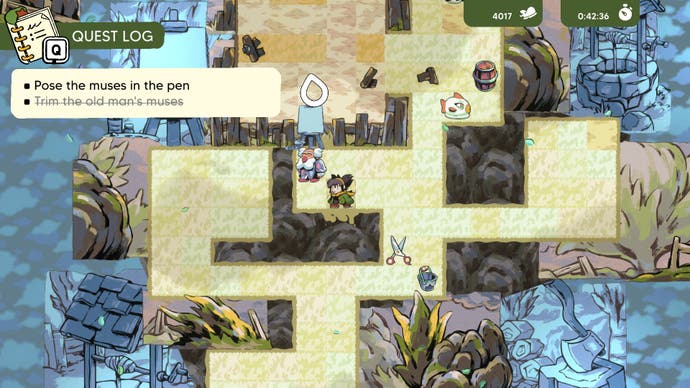
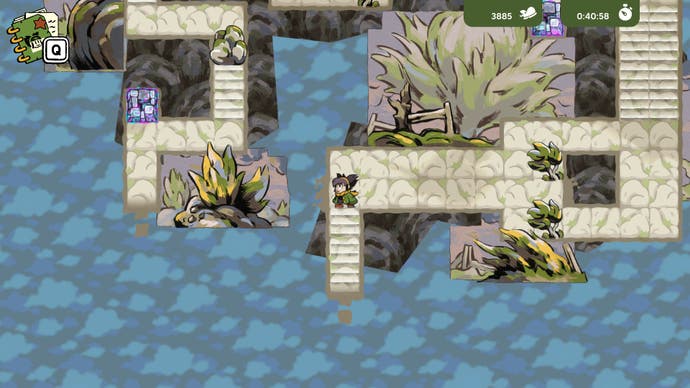
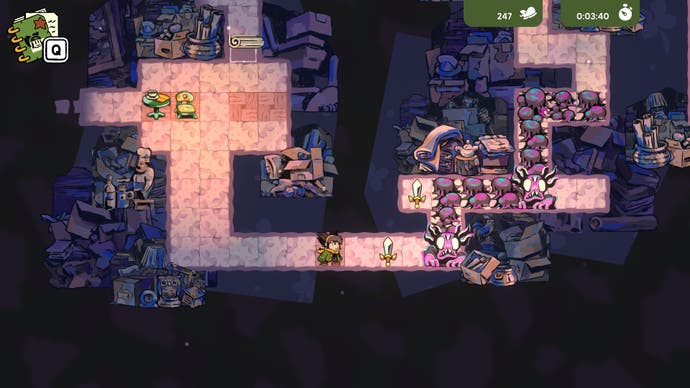
Navigation challenges are the game at its very simplest. Arranger quickly escalates to involve combat, which involves manipulating a weapon in a row or column until it bonks against an enemy, escort missions, in which you have to keep an object or person moving along with you, and even things like fishing mini-games. Fishing's a delight, in fact: you hook the fish and then have to move backwards from it, stretching your line over as many grid squares as you can. Eventually the fish will give up and just pop out of the water. You're done!
My favourite moments involved manipulating a raft that moved from one island to another in a town that felt a bit like an archipelago. No, my favourite bit involved busting someone out of a house, by blocking the eye-lines of their wardens with bits of furniture that were caught up in my rows and columns as I moved them. But that's the thing - it's hard to pick a favourite element of a game that takes its simple concept and tries to wring absolutely everything from it, varying puzzles with new elements, new gadgets, even the odd new ability, while simultaneously taking you away from your home town and out into the world on a grand adventure.
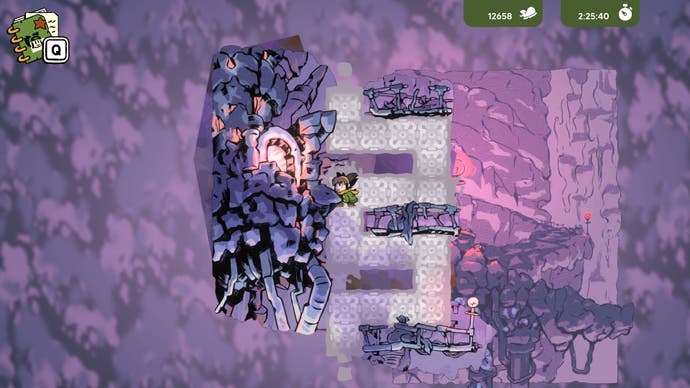
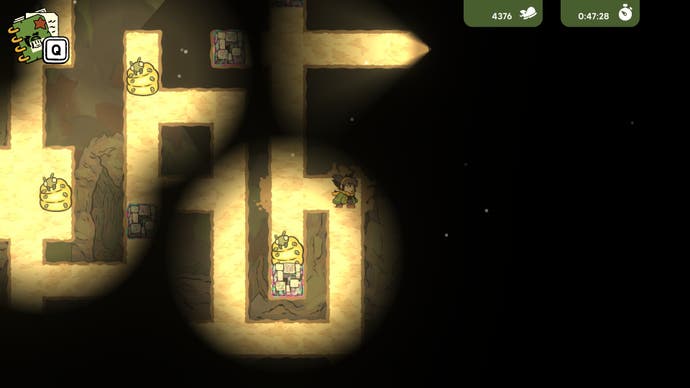
Along the way I picked up lots of little ways of handling situations, most of which were purely wordless to me: I would meddle with space just so, and the thing I wanted to happen would happen. I worked out how to close the gap between me and another object in the row or column I was in, for example, by moving in circles in a way that always felt like I was gathering yarn. I learned how to take objects or characters briskly around narrow corners with me; this one felt almost like tapping a security code I had long-since memorised briskly into a keypad. Everything in Arranger starts to feel like this: like a physical skill you have picked up. You're manipulating space in a way that makes total sense, but which you would struggle to explain to another person. Witchcraft!
Arranger has two informal modes, I would say. In one you're in the middle of a set-piece sequence of puzzles, moving through various rooms in a mansion, say, and handling single-screen puzzles that all build on the same series of elements. I like this stuff well enough, but I prefer the other mode, which is where you're just trying to get somewhere. The grid breaks into paths and little courtyards and you're still solving puzzles, but they're all of the get-me-from-A-to-B variety. Here's where Arranger feels like a sort of speculative, day-dreamy logic doodling. I know where I'm going, I trust myself to get there, so on the way, let's solve all these little moment-to-moment challenges.
All of this is helped along by a charming, playful script and gorgeous cartoon art by David Hellman, who created the art from Braid and here manages to invoke a world that feels chunky and yet detailed, lined with thick Fantagraphics brush strokes and in love with a form of picture-in-picture effect, which means that as you move through a room or meet a new character, the background may fill with panels offering other views of the action.
I never tired of the way the art fits together from one moment to the next, or the way that one puzzle taught me something that I would find myself inverting, subverting, and generally reworking a few puzzles later. Compact and playful and ingenious in the lightest, and least overbearing of ways, Arranger is just lovely.
A copy of Arranger: A Role-Puzzling Adventure was provided for review by Furniture & Mattress.
